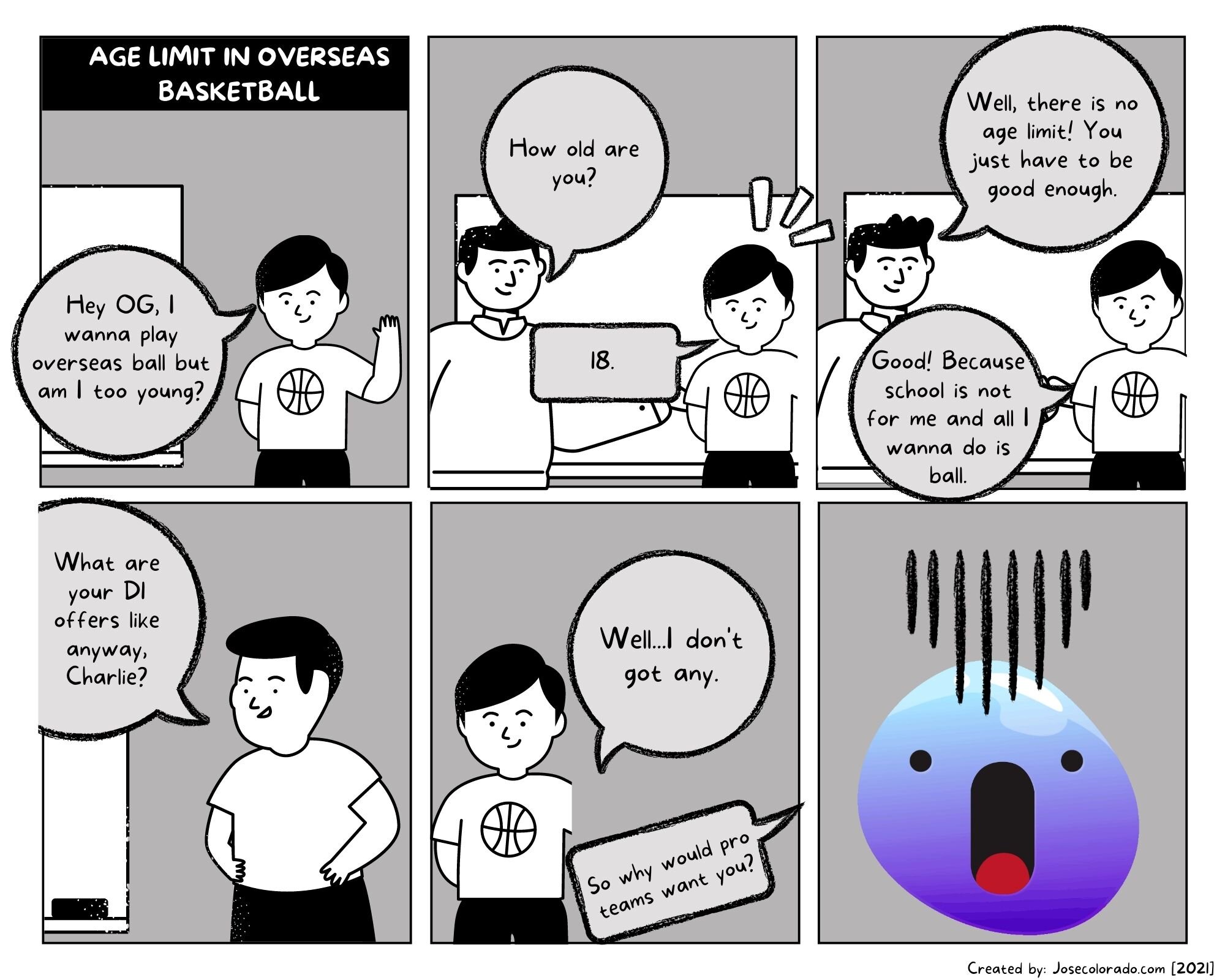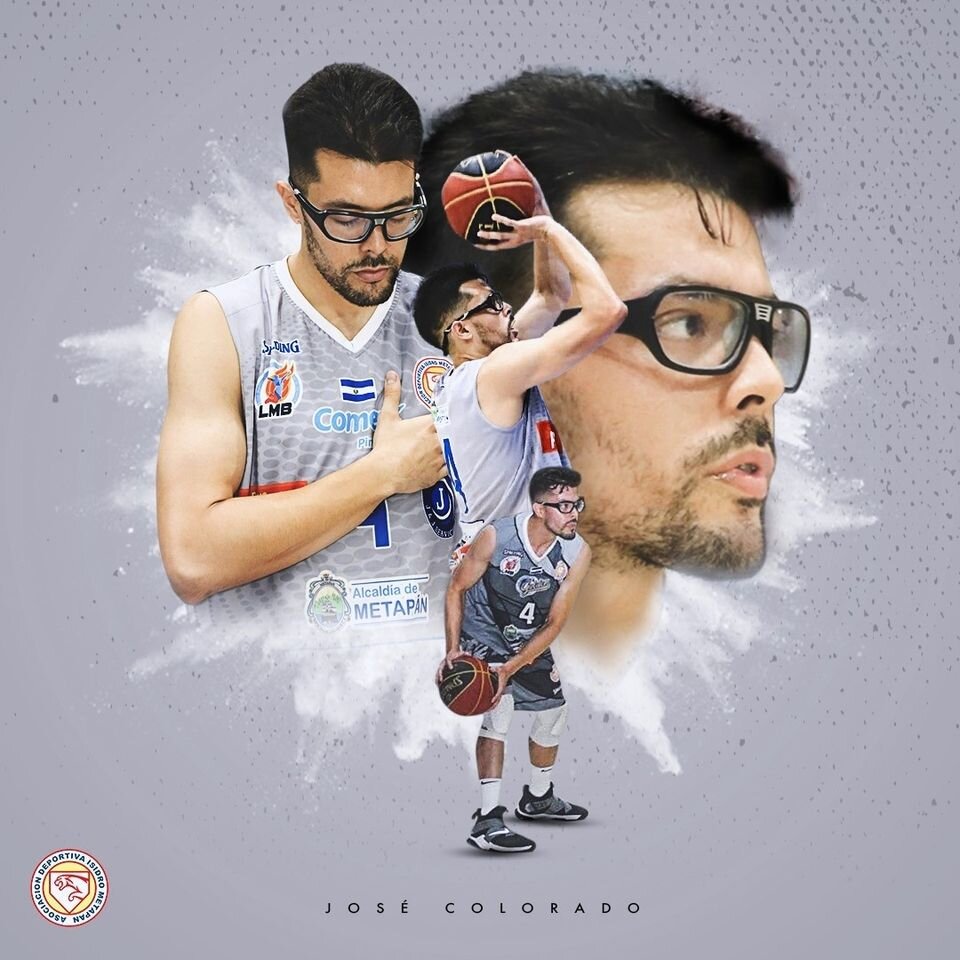How Old Do You Have To Be To Play Overseas Basketball? [Youngest Pro Players Across the World]
There is no age limit in overseas basketball.
So let’s get that out the way right now.
Instead:
Think of it as a talent or skill threshold that must be met.
Are you good enough?
If yes, then age doesn’t matter.
They’ll find you a spot.
But if not:
Things could get a bit more complicated when dealing with overseas professional clubs.
So let’s dive into the specifics of, “How old do you have to be to play overseas basketball?” to truly understand the dynamics.
how old do you have to be to play overseas basketball?
As a general rule, overseas basketball teams will give preference and seek out players who hold college (the higher the level, the better) or professional experience over all other candidates.
For that reason we can say, on average, to get your start in overseas basketball a player is typically between the ages of 21 - 25.
Now important to note here:
We’re talking about this through a North American perspective right now.
Not a European, African or Asian point of view where players can get their start much younger.
But even when discussing North America - outside of the NBA (19 years) - there is no age limit.
THAT MEANS PLAYERS COULD - IN THEORY - TURN PRO AT WHATEVER AGE AS LONG AS A PRO TEAM SAW LEGIT VALUE IN THEM.
In fact:
In 2019 this happened in one of Canada’s professional leagues, the NBLC, when the late Carl Lewis signed to the Sudbury Five at just 18-years old.
On a larger scale though:
The most famous example has to be in 2017 when current Charlotte Hornets’ star, LaMelo Ball signed with a Lithuanian club at just 16 years old.
Unlike the NBA, Overseas basketball players can turn pro at any age.
Nearly a decade before that, in 2008, Brandon Jennings pioneered the movement when he inked a deal with a first division club in Italy straight out of Oak Hill Academy.
Many younger overseas basketball players are turning professional at a younger age.
So it is possible.
But it’s rare.
And many of the players who took this route were highly recruited.
Guaranteed NBA lottery picks we’re talking about here.
So chances are, if you’re North American and you don’t fit into that profile, you’ll more than likely have to go through the traditional college route.
But think of the potential benefits in it.
You can:
Gain experience
Improve your skills
Improve your body/physicality
Mature emotionally
Play high-level competition
Even if you have attended a four-year college or university, all these factors will naturally be a concern for any professional club when considering a rookie player - regardless of age.
But with a teen player, they will be amplified.
Can you adapt to living in a foreign country with no supervision?
Are you mature enough to stay out of trouble?
Are you capable of getting around town on your own?
Will you get enough rest?
Can you feed yourself (cook) or know where/what to look for in meals?
Will you be tempted to hit the night life?
How committed are you to winning at that age?
There are many factors when considering how old you must be to play overseas basketball.
Remember:
AS A PROFESSIONAL PLAYER YOU ARE STEPPING INTO A MAN’S/WOMAN’S WORLD. NO ONE WILL BE BABYSITTING YOU. NO ONE WILL HOLD YOUR HAND.
For the most part, it’s YOU and YOUR responsibility to ensure you’re getting on well.
For that reason, many clubs WILL simply be turned off at the prospect of signing a young(er) North American player.
Emotionally and physically speaking, the cold hard truth is that the vast majority of you just aren’t ready.
Ultimately though:
There may be a few ways to get around these limitations…
can you play overseas basketball without going to college?
While the NBA G-League and overseas pro leagues have given a viable option for elite North American prospects to play professional basketball sans college, lower-profile players may want to consider entering a European basketball system during their middle/high school years if they are dead set on becoming a pro without going to college.
This is because the European basketball academy system has successfully been turning out pros with no college experience for years across the world.
Essentially:
In a European academy system a player is selected - or enrolled - into the system at an early age with the hopes that he/she “graduates” onto the senior level (i.e. pro team) of that club.
That is the expectation and ULTIMATE GOAL.
Whereas, when looking at the North American system, there really is no continuity or plan between high school - pros.
Sure, your high school coach may want you to become a pro because it will make his/her program look good.
But there is no formalized and strategic plan overseeing that YOU accomplish that goal.
In other words:
There is no universal development plan from high school to the pros.
Your high school - college - pro clubs will all likely have a different “vision” for your development.
In contrast:
European academy systems work in harmony with one another.
Coaches and teams know what skills, traits and experiences they want each player to develop at each stage of their player development process.
And as a result of this system, it isn’t uncommon to see players turn professional in their teens as skills and familiarity with certain systems are developed.
For this reason if you are serious about playing professionally without going to college then the European system may be a great option to look at.
Otherwise, it will be difficult coming from a traditional North American school system.
When did Luka Doncic play pro?
Dallas Mavericks star, Luka Doncic, famously got his big break in professional basketball at just 16-years-old when he suited up for Real Madrid in Spain’s ACB league.
Meanwhile Ricky Rubio also made his debut at the same age while Hall of Famer Tony Parker got his start at 17 years old in France - forgoing potential scholarship offers from UCLA and Georgia Tech in the process.
Now these are extreme cases of youngsters getting a shot in some of Europe’s top professional leagues.
But what about at the lower-levels where you’ll most likely have to start?
Well….it may surprise you, but yes, it also happens.
If you were to scour the rosters of Europe’s lower-level professional leagues, you’d see they are littered with 16-19-year-olds across the continent.
In fact:
When I did an advanced search on Eurobasket for only 15-19 year-olds in Spain’s lower divisions (LEB Plata, EBA), I found 184 current players in this age group!
Photo credit: Eurobasket
Essentially:
These lower-level leagues allow for youngsters to gain experience, confidence and develop while improving their stock in their careers.
So if you able to enroll/get selected to one of these European academies, then there would be a good chance you’d be able to skip the college experience and go straight to the pros (albeit a lower level of pro).
One final HACK:
Your passport.
If haven’t read any of my stuff regarding the importance of passports then I recommend you do it now.
It’s likely the most important piece to your career (outside of your GAME).
Basically:
If you have the right passport/nationality in a very-low level league (and that’s the key) then it’s possible teams could potentially give you a tryout simply based on the lack of national talent.
I’ve seen this occasionally in Central America.
Players with no college experience or massive gap years (5+) fly themselves down and tryout for teams (occasionally making the roster).
But please know:
With such a huge gap in playing experience, the chances of catching on are low even in low-level leagues.
Proceed with caution.
Basketball players can begin playing overseas basketball at a very young age if they have the right citizenship.
CONCLUSION
So there you have it.
While there is no formal age limit or a definitive answer to “How old you have to be to play overseas basketball?”, in reality teams and clubs have set a sort of standard of when they seriously begin considering players.
How old were you when you played overseas basketball?
Are you a young player looking to play overseas basketball without going to college?
Let me know in the comments below!
Jose Colorado is a 6-year professional basketball player helping others achieve their dreams of pro basketball with a proven and tested approach to overseas basketball.
READ MORE



